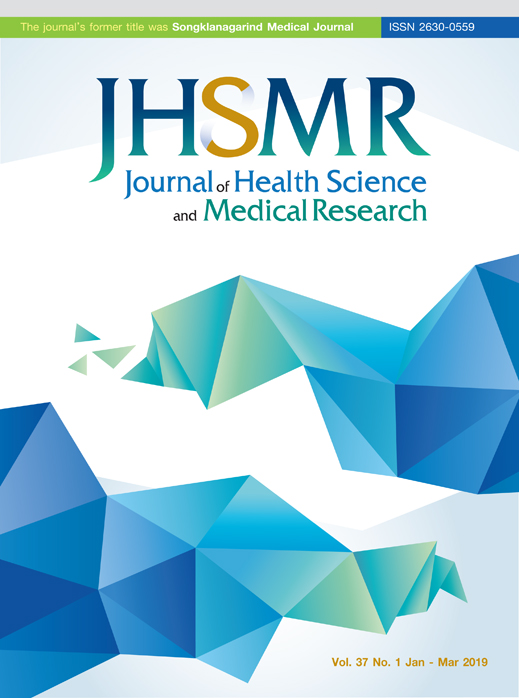The Effectiveness of Clinical Guidelines in the Diagnosis of Lynch Syndrome Compared to Microsatellite Instability and Immunohistochemistry Analyses in Southern Thailand
DOI:
https://doi.org/10.31584/jhsmr.201938Keywords:
accuracy, hereditary non-polyposis colorectal cancer (HNPCC), Lynch syndrome, mismatch repair gene, MSI analysisAbstract
Objective: This study aims to assess the accuracy of Amsterdam II criteria (AMII) and Revised Bethesda Guidelines (RBG) compared to molecular tests in Thai patients.
Material and Methods: One hundred eighty-one patients were enrolled. Demographic data and pathological features and locations of tumors were recorded. Family history of the patients was reviewed by AMII and RBG. Tissue samples were collected and molecular testing was tested by microsatellite instability (MSI) analysis and immunohistochemistry (IHC). Statistical analysis was used to estimate the sensitivity and specificity of AMII and RBG compared to molecular testing.
Results: Of the patients, 2.8% fulfilled the AMII criteria and 28.1% met the RBG criteria. Molecular testing showed 16.57% and 13.8% of the samples lost at least 1 out of 4 mismatch repair (MMR) proteins in the IHC test. In addition, 10.5% of patients had both microsatellite instability high (MSI-H) and loss of protein MMR expression. The sensitivity and specificity of AMII were 6.7% and 98.0%, respectively, while for the RBG they were 70.0% and 82.1%, respectively.
Conclusion: The present study suggests that for patients who complete the AMII, doctors should be highly suspicious of Lynch syndrome, due to its high specificity. The RBG is useful for screening for Lynch syndrome and the selection of individuals for further molecular testing.
References
2. Jasperson KW, Tuohy TM, Neklason DW, Burt RW. Hereditary and familial colon cancer. Gastroenterology 2010;138:2044-58.
3. Lynch HT, Lynch PM, Lanspa SJ, Snyder CL, Lynch JF, Boland CR. Review of the Lynch syndrome: history, molecular genetics, screening, differential diagnosis, and medicolegal ramifications. Clin Genet 2009;76:1-18.
4. Lindor NM, Petersen GM, Hadley DW, Kinney AY, Miesfeldt S, Lu KH, et al. Recommendations for the care of individuals with an inherited predisposition to Lynch syndrome: a systematic review. JAMA 2006;296:1507-17.
5. Wu Y, Berends MJ, Mensink RG, Kempinga C, Sijmons RH, van Der Zee AG, et al. Association of hereditary nonpolyposis colorectal cancer–related tumors displaying low microsatellite instability with MSH6 Germline mutations. Am J Hum Genet 1999;65:1291-8.
6. Lanza G, Gafà R, Maestri I, Santini A, Matteuzzi M, Cavazzini L. Immunohistochemical pattern of MLH1/MSH2 expression is related to clinical and pathological features in colorectal adenocarcinomas with microsatellite instability. Mod Pathol 2002;15:741-9.
7. Peltomaki P, Vasen H. Mutations associated with HNPCC predisposition -- Update of ICG-HNPCC/INSiGHT mutation database. Dis Markers 2004;20:269-76.
8. Barnetson RA, Tenesa A, Farrington SM, Nicholl ID, Cetnarskyj R, Porteous ME, et al. Identification and survival of carriers of mutations in DNA mismatch-repair genes in colon cancer. N Engl J Med 2006;354:2751-63.
9. Umar A, Boland CR, Terdiman JP, Syngal S, de la Chapelle A, Rüschoff J, et al. Revised Bethesda Guidelines for hereditary nonpolyposis colorectal cancer (Lynch syndrome) and microsatellite instability. J Natl Cancer Inst 2004;96:
261-8.
10. Hampel H, Frankel WL, Martin E, Arnold M, Khanduja K, Kuebler P, et al. Screening for the Lynch syndrome (hereditary nonpolyposis colorectal cancer). N Engl J Med 2005;352:1851-60.
11. Hampel H, Frankel WL, Martin E, Arnold M, Khanduja K, Kuebler P, et al. Feasibility of screening for Lynch syndrome among patients with colorectal cancer. J Clin Oncol 2008;26:5783-8.
12. Moreira L, Balaguer F, Lindor N, de la Chapelle A, Hampel H, Aaltonen LA, et al. Identification of Lynch syndrome among patients with colorectal cancer. JAMA 2012;308:1555-65.
13. Tranø G, Sjursen W, Wasmuth HH, Hofsli E, Vatten LJ. Performance of clinical guidelines compared with molecular
tumour screening methods in identifying possible Lynch syndrome among colorectal cancer patients: a Norwegian population-based study. Br J Cancer 2010;102:482-8.
14. Chang SC, Lin PC, Yang SH, Wang HS, Liang WY, Lin JK. Taiwan hospital-based detection of Lynch syndrome distinguishes 2 types of microsatellite instabilities in colorectal cancers. Surgery 2010;147:720-8.
15. Vasen HF1, Möslein G, Alonso A, Bernstein I, Bertario L, Blanco I, et al. Guidelines for the clinical management of Lynch syndrome (hereditary non-polyposis cancer). J Med Genet 2007;44:353-62.
16. Boland CR, Thibodeau SN, Hamilton SR, Sidransky D, Eshleman JR, Burt RW, et al. A National Cancer Institute Workshop on Microsatellite Instability for cancer detection and familial predisposition: development of international criteria for the determination of microsatellite instability in colorectal cancer. Cancer Res 1998;58:5248-57.
17. Aaltonen LA, Salovaara R, Kristo P, Canzian F, Hemminki A, Peltomäki P, et al. Incidence of hereditary nonpolyposis colorectal cancer and the feasibility of molecular screening for the disease. N Engl J Med 1998;338:1481-7.
18. Loukola A, Eklin K, Laiho P, Salovaara R, Kristo P, Järvinen H, et al. Microsatellite marker analysis in screening for hereditary nonpolyposis colorectal cancer (HNPCC). Cancer Res 2001;61:4545-9.
19. Herman JG, Umar A, Polyak K, Graff JR, Ahuja N, Issa JP, et al. Incidence and functional consequences of hMLH1 promoter hypermethylation in colorectal carcinoma. Proc Natl Acad Sci U S A 1998;95:6870-5.























